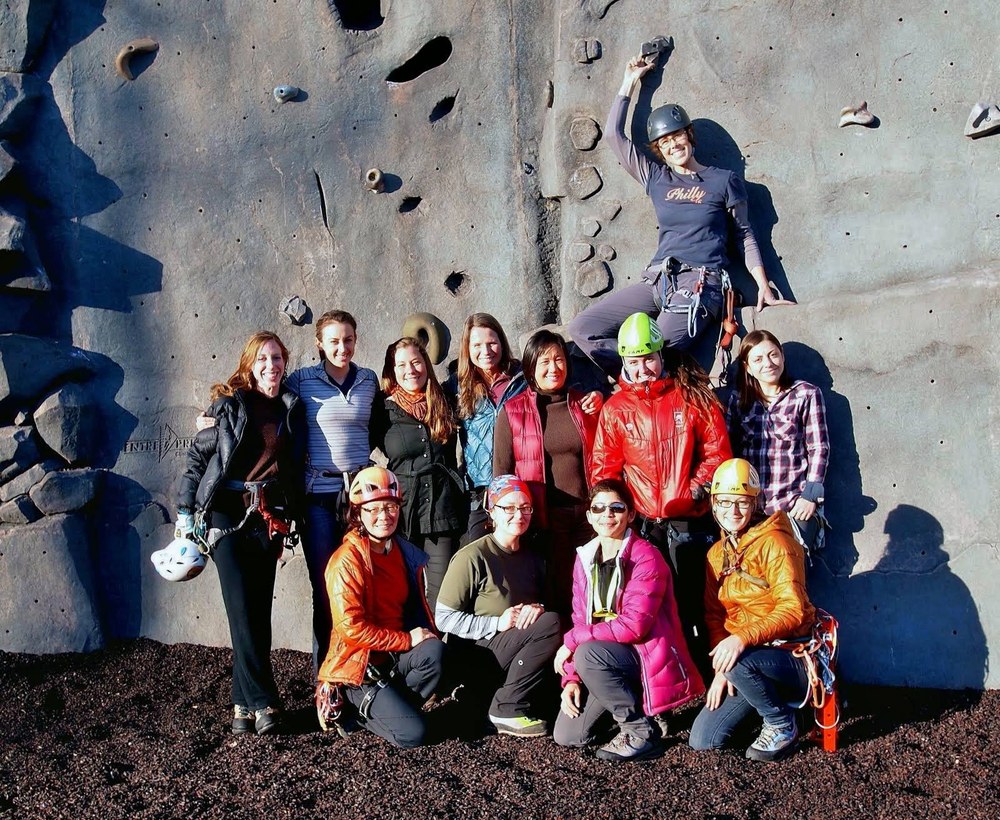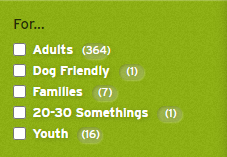
At The Mountaineers, we believe a diverse and inclusive outdoors inspires unity, respect, and passion for the places we love. This belief is reflected in our core values and is the driving vision to foster outdoor experiences where all people feel belonging. One way we strive to do that is through affinity group activities.
WHAT IS AN AFFINITY GROUP?
An affinity group is a group of people linked by a shared identity. Affinity groups are often formed around gender, age, race, body size, or sexual orientation, but they can also be built around a common goal, like staying sober. The unifying characteristic of an affinity group is usually an identity that has been traditionally underrepresented or historically excluded, which can make people feel isolated or uncomfortable in a larger group.
In the case of The Mountaineers, we define affinity groups as a group of people linked by a shared identity which has been traditionally underrepresented or holistically excluded within The Mountaineers or outdoor recreation community.
WHY ARE AFFINITY GROUPS IMPORTANT?
Affinity groups are important because they often give people a stronger sense of belonging within a larger community. In large organizations like The Mountaineers, this can be particularly important for individuals who are in the minority. By limiting affinity groups to people who share a common identifier, the affinity group remains a comfortable, safe learning space where members can connect more deeply and authentically.
That’s because safety isn't just about helmets and life jackets. Emotional safety is key for a positive experience in the outdoors, and affinity groups help ensure that individuals have a safe and comfortable space to recreate. When someone feels emotionally/psychologically safe, they can show up in a learning environment as they are without worrying about how others will perceive or judge them. Offering trips where participants feel emotionally safe directly correlates to having physically safe experiences.
One such example of the importance of emotional safety is often cited in avalanche education. When discussing the human factors in avalanche incidents, studies show that all-female groups make better decisions in risky situations than all-male or mixed-gender groups. Even groups with two or more women are significantly less likely to be involved in an avalanche. Why? Because women often feel more comfortable speaking up around other women. By offering affinity groups, we create spaces where people feel empowered and confident to share fears and discuss alternative goals, leading to safer outdoor experiences.
Offering affinity spaces benefits not only the individuals in those groups, but The Mountaineers as a whole. Studies show that organizations that support affinity groups often have better recruitment and retention, can be more innovative thanks to a diversity of ideas, and benefit from deeper connections within the community. These benefits directly support our ability to make good on our mission, now and into the future.
DOES THE MOUNTAINEERS HAVE AFFINITY GROUPS?
Yes! Historically we have offered women-only courses and activities (like the all-women Basic Climbing SIG led by Stefanie Schiller in 2017, pictured at top) and supported the formation of MountainQueers for those who identify as LGBTQ+.
To search for affinity group activities, use the left navigation bar of our activity and course search to select the groups you are interested in under the “For…” menu. Note that we list both affinity groups and audiences in this section, and that the options will only show up when a related activity is listed.

As defined above, affinity groups are a group of people linked by a shared identity which has been traditionally underrepresented or historically excluded. Currently, we have affinity groups for individuals who identify as LGBTQ+ and women. Audiences are groups of people who share commonalities, which may or may not be linked by shared identities, and which are traditionally represented in The Mountaineers and outdoor recreation. Audiences include adults, beginners, dog friendly, families, youth and age-based groups.
Additional information FOR LEADERS
DO AFFINITY GROUPS HAVE THEIR OWN COMMITTEES?
No. Generally, committees at The Mountaineers are formed around a specific activity type. Leaders of affinity groups need to be certified as leaders through other activities (for example, if someone wants to lead a women-only hike, they need to be a certified Hike Leader through their branch). Then, if you are interested in leading an affinity activity, all you need to do is check the appropriate group when you list your activity on our website.
HOW DO I POST AN AFFINITY GROUP ACTIVITY OR COURSE?
When you list an activity or course on our website, select the relevant group in the “Audiences & Affinity Group” section.
Note that both affinity groups and audiences are in this section. As defined above, affinity groups are a group of people linked by a shared identity which has been traditionally underrepresented or historically excluded. Currently, we have affinity groups for individuals who identify as LGBTQ+ and women. Audiences are groups of people who share commonalities, which may or may not be linked by shared identities, and which are traditionally represented in The Mountaineers and outdoor recreation.
The default will be Adult, which means the activity is open to all adults. Please only choose an additional or alternate audience type if the activity is specifically geared for that group. If your activity is meant for a specific affinity group, you’ll likely choose both Adult and the affinity. Only qualified leaders who identify as a member of the affinity group should offer activities for that group.
Don’t see the affinity group you’d like? Email info@mountaineers.org to request a new affinity group and discuss how it would benefit individuals and our broader community.
One of the reasons I became a climb leader was because of the support of my women's climbing mentor group during my first and second year as an intermediate student. Every other month we'd have a potluck at a member's house which was a great place to share climbing goals and perhaps more importantly apprehensions we had about all things climbing. It was a safe place to ask for additional help and guidance and to be inspired by others working towards similar goals.
-Tess Wendel, Super Volunteer & Climb Leader
REFERENCES & ADDITIONAL READING
The following is a list of great articles pertaining to affinity groups and single-identity spaces. Please share additional resources in the comments!
- Becoming Backwoods Barbie, Basic Alpine Climbing Grad Bam Mendiola
- Finding Belonging Through Age-Focused Activities, Hike Leader Joshua Stein
- Equity Means Supporting Single Identity Spaces, Aparna Rajagopal-Durbin
- Going It Alone, Rahawa Haile
- Nature's Calling - For More Human Diversity, Alexandra Pattillo
- I Would But: I Am the Only Person of Color, Ambreen Tariq
Trying something new — something that requires learning new skills and information — is hard enough. But feeling out of place in a seemingly homogeneous community can put you at a further disadvantage. I have struggled with these anxieties my whole life. As a woman of color and someone who started exploring the outdoors only a few years ago, I often find myself saying no to new outdoors activities because I lack the courage to challenge my self-doubt and to do so while feeling uncomfortable or fearful of being the only person of color in that space. And please don’t disregard my discomfort with being a minority in the outdoors as a personal flaw that is unique to someone who is overly racially sensitive. Needing community and empathy is part of the human condition. - Ambreen Tariq
This article was originally published in May 2018. It was Updated to refLEct our improved website functionality on October 17, 2025.
Add a comment
Log in to add comments.Are hikes etc organized by Mountain-Queers open to any member?
 The Mountaineers
The Mountaineers